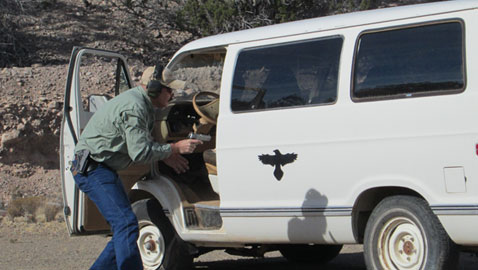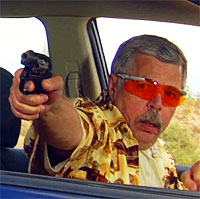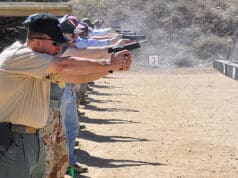
Early one morning Fidel and I were working together when we caught a group of eight illegals in a steep finger canyon below Otay Mesa. Lining them up in the narrow draw I led them out while Fidel brought up the rear. As we topped out on the mesa Fidel shouted a warning. Glancing over my shoulder I saw a man coming at me with a butcher knife raised over his head. Spinning into him and drawing my pistol, I knew he had me beat – I wasn’t going to get my gun up before he connected with the knife. Much to my surprise and everlasting gratitude, Fidel somehow flew through the air like Superman and tackled the knife man. As I swung around my .357 Magnum connected with the side of my attacker’s head and I stomped his knife hand with my boot. This little disgusto lasted only seconds and I was more angry than excited or fearful, but a minute or two later my body caught up and slammed me with a stress reaction.
The flight or fight response is how our bodies protect us from danger. Muscles tighten, our breathing quickens, the heart beats faster and blood is diverted to the large muscle groups. As we tremble and sweat our hearing and eyesight are affected and we enter into an altered perceptual state of time and distance. You might wonder how anyone could perform complex tasks while experiencing high stress levels but people do it all the time. Pilots, soldiers, police officers, fire fighters and emergency medical providers are just some of the examples of folks who work in high stress environments. What’s their secret? It’s repetitive training and experience.
If we relate this to defensive firearms training, the goal should be to make our skills reflexive – able to be performed without conscious thought. The draw from a holster is a good example. Breaking the skill down into small steps in the beginning, you progress to one smooth motion you can perform without thinking about the individual steps. And then, with practice, one day when you need it, the pistol will seem to appear in your hand without conscious thought – the skill has become reflexive. Reflexive skills are the ones we need when the spit is spinning off the fan blades and there is no time to think.
Aside from living through multiple gunfights, here are some of the things defensive shooters can do to increase their tolerance and learn to perform at high stress levels; what I refer to as stress inoculation:
Training against the clock
People seem to lose it when you put them on the clock, something we see in class when we use turning targets or run a timed drill. Train with a stopwatch or a shot timer and you’ll learn to operate under the pressure of time.
Practicing complex skills
Advanced skills are nothing more than a combination of basic skills applied to a particular problem. Practicing complex skills until they become routine helps you perform them more easily in high stress environments.
Competing
Competition is a great way to develop the ability to stay cool under pressure. Whether informally among training partners or in an organized match, competition combines the need to perform complex skills under time pressure while others are watching, a guaranteed stressful environment.
Tactical simulator and force on force training
Getting off the training range and into simulators may be the best way to increase your tolerance to stress. Live fire tactical simulators where you have to work your way through a problem sorting out the shoot targets from the no-shoots will force you to learn that you need to apply basic marksmanship skills to be successful and will greatly increase your ability to operate at high stress levels. Shoot houses are to shooters as flight simulators are to pilots and both accomplish the goal of teaching proper responses to emergencies.
Force on force is situational training where you interact with other people to create a complex training experience. Less-lethal guns and training ammunition are used and safety is a huge consideration. This advanced training is the ultimate in high stress level firearms training because it most closely resembles reality.
Mental conditioning
Mental preparation – getting your mind right, as a SEAL friend of mine stated it – may be the most important component in stress management. Anticipating, then visualizing how an event may unfold while planning your response in advance is part of it. The other part, knowing you can act, and you will act to solve the problem, is just as important.
Stress management
Remember to breath. This sounds ridiculous but in fact people tend to hold their breaths when they’re stressed. Take a big, deep breath, pause, and blow it out forcefully. Repeat several times and you can significantly lower your blood pressure, slow down your racing heart, minimize the physiological effects of stress and regain control. If faced with a complex problem start breaking it down into simple tasks you can perform one at a time, as this provides goals you can more immediately accomplish, rather than being overwhelmed by the entire problem.
The pursuit ended suddenly when the deputy followed the suspect into a parking lot with no way out. After blocking the exit the deputy got out of his car. The suspect vehicle turned around and accelerated towards him, then the driver pointed a pistol out the window and started firing. The deputy drew his pistol and fired two quick shots, ending the career of the wannabe cop killer. I learned about this when the deputy called and told me the story. You see, he was a student of mine and had recently completed a pistol class at Gunsite. He said, “Ed, it was just like being on the range in class. I wasn’t excited or scared; I was completely calm and simply did what I had done hundreds of times before during training.” It’s hard for me to maintain my composure when I hear these stories – I’ve heard hundreds of them – because I always cry at happy endings. If the time comes, I hope your story has a happy ending as well.
About the Author:
 Ed Head is a regular on Shooting Gallery, Gun Stories and Down Range TV. He has worked for almost 30 years in law enforcement, first in the United States Air Force and then with the United States Border Patrol, retiring as a Field Operations Supervisor. During his Border Patrol career, Ed worked in a variety of patrol, investigative and training capacities. Ed has an extensive background as a firearms instructor, having trained thousands, ranging from beginners to police, military and special operations personnel. Having taught at Gunsite for 20 years, Ed first trained there under the world famous shooting school’s founder, Jeff Cooper, then later ran the school as the operations manager for more than five years. Ed lives in Chino Valley, Arizona, where he continues to teach and write.
Ed Head is a regular on Shooting Gallery, Gun Stories and Down Range TV. He has worked for almost 30 years in law enforcement, first in the United States Air Force and then with the United States Border Patrol, retiring as a Field Operations Supervisor. During his Border Patrol career, Ed worked in a variety of patrol, investigative and training capacities. Ed has an extensive background as a firearms instructor, having trained thousands, ranging from beginners to police, military and special operations personnel. Having taught at Gunsite for 20 years, Ed first trained there under the world famous shooting school’s founder, Jeff Cooper, then later ran the school as the operations manager for more than five years. Ed lives in Chino Valley, Arizona, where he continues to teach and write.



Ed Head makes a strong recommendation for participating in shooting competition as a way to prepare for real world attacks. In recent years it been more common to read that competition is too unrealistic to be of much value as training.
I am a fan of stress conditioning. My time in the Army was about the best stress conditioning I have ever experienced. Though the stress of competition is not combat, it is still stress, performing in the presence of your friends.
I am a competitive person and at age 75 still compete in action pistol and steel silhouette at long range. It is fun, it is competitive and it keeps this old man in the game.
In action pistol the scenarios are silly, but the stress is real if you want to win. If you do not want to win why are you competing?
Another way to learn to handle life and death situations is to spend your time walking into biker bars and hitting on their women wearing a Harley sucks Tee shirt…..:)